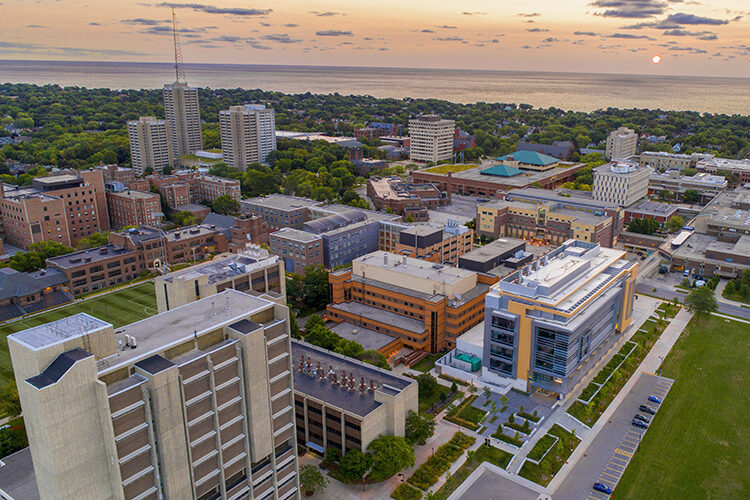Eight schools or colleges at UWM would merge to form four new colleges in a proposal expected to be reviewed by the University of Wisconsin System Board of Regents.
If approved by the regents at their board meeting Feb. 10-11, the process of realigning the current schools and colleges would begin immediately, with the new colleges in place by July 1, 2023.
The mergers would reduce administrative layers, produce a still-to-be determined amount of cost savings and efficiencies, and allow for better coordination of student services like advising, according to the proposal, which the UWM Faculty Senate approved in December.
However, realignment is not intended as a means to reduce staffing, the proposal says, and course offerings and programs would remain the same in the new structure. Additionally, there will be no impact on student matriculation, progress or graduation.
2030 report recommendations
The realignment plan is the result of work by a team of faculty, staff and administrators that followed up on recommendations in the 2030 report released in March 2021.
The 2030 report, which is intended to guide UWM into the next decade and beyond, also issued sweeping recommendations in areas such as increasing inclusion and diversity, and becoming a more student-centric university.
Envisioning school and college realignment has been one of the top initial priorities for the 2030 Action Team, formed to act on the 2030 report recommendations.
Acting on the recommendations “was a truly complex task, given the many possible combinations for restructuring, as well as faculty and staff attachment to, and pride in, their schools and colleges,” UWM Provost Johannes Britz said.
“The Action Team successfully identified strong alignments that will advance UWM while retaining the distinctive attributes of the current school and college array,” Britz added.
These new colleges would result from the proposed mergers:
College of Architecture and the Arts
- Would be comprised of the School of Architecture and the Peck School of the Arts.
- Schools would maintain their own identities within the college.
- The Department of Urban Planning, currently housed in the School of Architecture and Urban Planning, would move to the new College of Applied Social Sciences. (See below.)
Peck and the School of Architecture and Urban Planning are currently led by interim deans. A search for a dean for the new college would be conducted.
College of Applied Social Sciences
- Would be comprised of the School of Education, Helen Bader School of Social Welfare, School of Information Studies and Department of Urban Planning.
- The three schools would retain current names and structures, with Education and Social Welfare still structured by department, and Information Studies remaining non-departmentalized.
- Education and Information Studies currently have interim deans. Social Welfare dean Tina Freiburger would become dean of the new college.
Programs from UWM’s three current health-related colleges or schools will be realigned into two colleges.
Joseph J. Zilber College of Public Health
- Would be comprised of the Zilber School of Public Health and the following College of Health Sciences departments or programs:
- Kinesiology department and Nutrition program
- Health Informatics faculty and associate programs
- Programs in the new college focus on population health.
- The new college will not be organized into schools because such a structure is not recognized in the accreditation requirements by the Council on Education for Public Health.
- Public Health is currently led by an interim dean. Health Sciences dean Timothy Behrens would become dean of the new college.
College of Health Professions and Sciences
- Would be comprised of the School of Nursing, School of Biomedical Sciences and School of Rehabilitation Sciences and Technology. The latter two schools would be formed out of departments currently in the College of Health Sciences.
- Programs in the new college would focus on health care.
- Kim Litwack, dean of the College of Nursing, would become dean of the new college.
In addition, the Graduate School is merging with the Office of Research, though the change is strictly administrative and only requires the approval of UWM leadership.
The following schools and colleges would not be affected by realignment:
- Lubar School of Business
- School of Continuing Education
- College of Engineering & Applied Science
- School of Freshwater Sciences
- College of General Studies
- College of Letters & Science
No impact on staffing levels
The realignment proposal says there was “no anticipated impact on the number of faculty, academic and university staff.” Students were not expected to be affected by the changes, according to the proposal, other than a name change to their school or college.
Other key points from the proposal:
- Realignment would foster more opportunities for collaboration between research and academic programs.
- No changes were anticipated in what buildings or other spaces were used by programs.
“School and college realignment was not a budget-cutting exercise,” Britz said. “Although cost considerations and efficiencies were part of the 2030 planning process, the realignment recommendations were the result of a deep analysis of actions that could position UWM for the future.”







